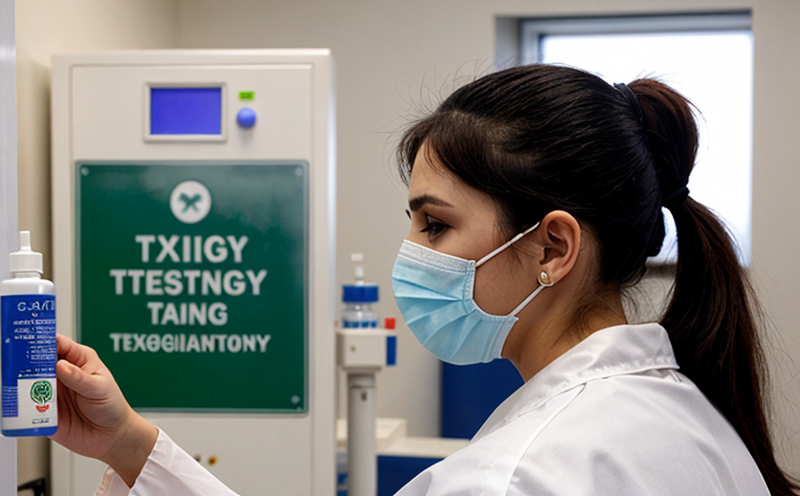Target Organ Toxicity Evaluation Testing
In the pharmaceutical sector, target organ toxicity (TOT) evaluation testing is a critical component of ensuring drug safety and efficacy. This service focuses on assessing the potential adverse effects that drugs or compounds may have on specific organs or tissues within the body. It plays a pivotal role in the regulatory approval process for new medications by identifying any harmful impacts they might cause at various stages of development.
During the early phases of drug discovery and preclinical research, TOT evaluations help researchers understand how different compounds interact with vital organs such as the liver, kidneys, heart, lungs, nervous system, and reproductive organs. By conducting these tests, pharmaceutical companies can make informed decisions regarding further clinical trials or potential modifications to improve safety profiles.
The primary purpose of TOT testing is to evaluate whether a drug candidate causes damage or dysfunction in specific target organs when administered at therapeutic concentrations. These assessments are essential for determining appropriate dosages and identifying any necessary adjustments during formulation development. Regulatory agencies like the FDA, EMA, and WHO require comprehensive toxicity data before approving new drugs for public use.
To perform TOT evaluations effectively, laboratories must adhere to stringent guidelines provided by international standards such as OECD Guidelines (OECD 408) and ICH S7B recommendations. These protocols outline detailed procedures for conducting in vitro and in vivo studies using various animal models or human cell lines depending on the nature of the compound being tested.
In vitro methods involve exposing isolated cells from target organs to test substances under controlled conditions, allowing researchers to observe changes at a molecular level without involving whole animals. In contrast, in vivo approaches utilize live organisms like rodents, rabbits, dogs, or monkeys where prolonged exposure allows for more comprehensive observations of physiological responses over time.
Specimen preparation plays a crucial role in ensuring accurate results during TOT evaluations. Samples need to be collected meticulously according to predefined protocols, stored appropriately to maintain integrity, and analyzed using advanced analytical techniques such as histopathology, biochemical assays, or molecular biology approaches. Proper sample handling ensures reliable data interpretation throughout the testing process.
Instrumentation used in TOT evaluation varies based on the specific tests being conducted but typically includes microscopes for visual inspection of tissue sections stained for particular biomarkers; chromatography systems for quantifying metabolites or breakdown products; and spectrophotometers for measuring enzyme activity levels. Advanced imaging technologies like MRI, CT scans, or PET/CT hybrid imagers provide non-invasive means to monitor organ function during treatment.
Once completed, the data collected from TOT evaluations are compiled into detailed reports that summarize findings related to organ-specific toxicity endpoints including hepatotoxicity (liver damage), nephrotoxicity (kidney impairment), cardiotoxicity (heart effects), neurotoxicity (nervous system alterations), or endocrine disruption. These reports serve as valuable resources for regulatory submissions, internal decision-making processes within pharmaceutical companies, and ongoing safety monitoring efforts post-market approval.
- Quality and Reliability Assurance:
- Strict adherence to international standards such as OECD Guidelines (OECD 408) and ICH S7B recommendations ensures consistent and accurate results across all TOT evaluations performed by our laboratory.
The reliability of TOT evaluation data directly impacts the success rates of drug candidates advancing through clinical trials. By providing high-quality, reproducible results, we contribute significantly to reducing the risk associated with adverse events observed during later stages of development or after launch.
Benefits
The benefits of conducting Target Organ Toxicity Evaluation Testing extend beyond mere compliance; they offer substantial value to various stakeholders involved in drug discovery and development:
- Enhanced Safety Profiles: Identifying potential organ-specific risks early in the pipeline allows for targeted interventions, improving overall patient safety. Cost Savings: Avoiding costly late-stage failures due to unforeseen toxicity issues saves time and resources across all phases of drug development.
For quality managers responsible for ensuring product safety throughout production cycles, TOT evaluations provide critical insights into potential risks associated with new formulations or process changes. Compliance officers can leverage this information during regulatory audits or when negotiating terms with suppliers.
R&D engineers benefit from detailed understanding of how different compounds affect various organs, enabling them to optimize drug design and minimize unwanted side effects. Procurement teams gain confidence knowing that the raw materials they source meet stringent quality standards regarding potential toxicity concerns.
Quality and Reliability Assurance
- Strict Adherence to International Standards: Our laboratory complies rigorously with international guidelines such as OECD Guidelines (OECD 408) and ICH S7B recommendations, ensuring consistency and accuracy in all TOT evaluations.
- Trained Personnel: Highly skilled scientists and technicians perform each evaluation using state-of-the-art equipment and techniques, guaranteeing precise measurements and interpretations.
The reliability of our TOT evaluation data is paramount for regulatory submissions and internal decision-making processes. We maintain strict quality control measures throughout the entire testing process to ensure consistent results across multiple projects. Our commitment to excellence in this area has earned us a reputation as a trusted partner among leading pharmaceutical companies worldwide.
Competitive Advantage and Market Impact
- Enhanced Reputation: Providing accurate, reliable TOT evaluation results enhances our laboratory's credibility within the industry, fostering long-term relationships with satisfied clients.
- Faster Time-to-Market: By identifying potential toxicity issues early in the development process, pharmaceutical companies can save valuable time and resources, accelerating their path to market approval.
The ability to deliver high-quality TOT evaluation services distinguishes us from competitors and positions our laboratory as a leader in drug safety assessment. This competitive edge translates into greater market share and increased profitability for our clients.





